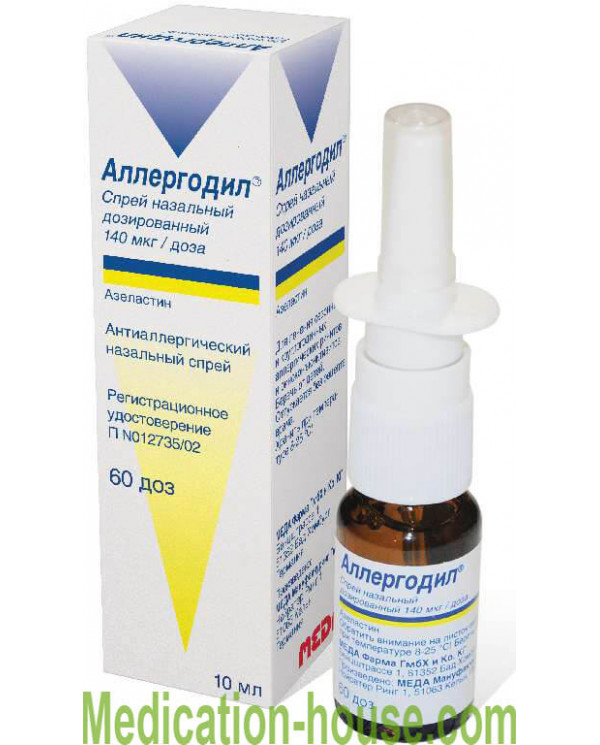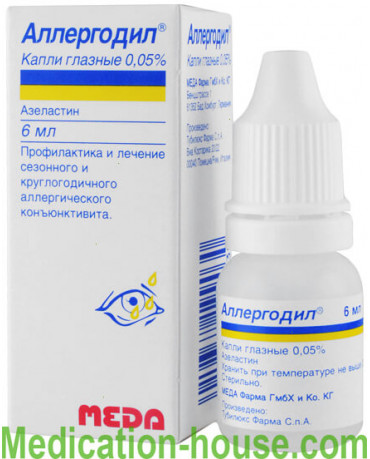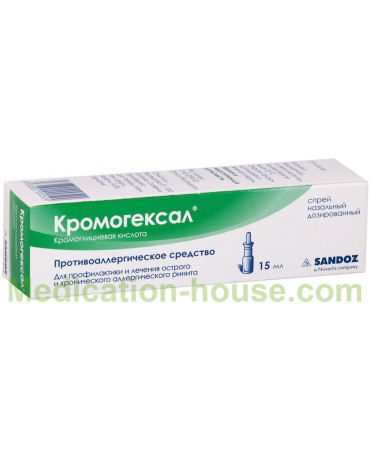Allergodil instruction
To buy Allergodil just add it to your shopping cart
Composition
1 dose contains:
Active substance:
azelastine hydrochloride 0.140 mg;
Excipients: hypromellose 0,140 mg; disodium edetate dihydrate 0,700 mg; citric acid 0.061 mg; sodium hydrogen phosphate dodecahydrate 0.907 mg; sodium chloride 0.961 mg; purified water 138.419 mg.
Description:
Transparent, colorless or almost colorless solution.
Pharmacotherapeutic group:
Antiallergic - H1 histamine receptor blocker.
pharmachologic effect
Azelastine, a phthalazinone derivative, is a long-acting antiallergic agent. Being a selective H1-histamine blocker, it has antihistamine, antiallergic and membrane-stabilizing cells, reduces the capillary permeability and exudation, stabilizes the membranes of mast cells and prevents the release of biologically active substances from them (histamine, serotonin, leukotrienes, activating synthesis cells). and promoting the development of early and late stages of allergic reactions and inflammation. When applied topically, the systemic effect is insignificant. Intranasal administration reduces itching and nasal congestion, sneezing and rhinorrhea. The weakening of the symptoms of allergic rhinitis is observed, starting from 15 minutes after application and lasts up to 12 hours or more.
Clinically significant effects on QT (QTc) interval is absent even with prolonged use of high doses of azelastine.
Pharmacokinetics
Bioavailability after intranasal use is about 40%.
The maximum concentration (Cmax) in the blood after intranasal use is achieved in 2-3 hours. When applied intranasally in a daily dose of 0.56 mg azelastine hydrochloride (one injection in each nasal passage twice a day), the average equilibrium concentration of azelastine hydrochloride in plasma 2 hours after administration is 0.65 ng / ml.
Doubling the total daily dose and 1.12 mg (two injections into each nasal passage twice a day) leads to a steady average plasma concentration of azelastine equal to 1.09 ng / ml.
However, despite the relatively high absorption in patients, the systemic exposure after intranasal use is approximately 8 times lower than after oral administration of a daily dose of 4.4 mg azelastine hydrochloride, which is a therapeutic oral dose for the treatment of allergic rhinitis.
Intranasal use in patients with allergic rhinitis causes an increase in plasma azelastine levels compared with healthy subjects. Other pharmacokinetic data are studied when applied orally.
Communication with blood proteins 80-90%.
Metabolized in the liver by oxidation with the participation of the cytochrome P450 system with the formation of the active metabolite dezmetilazelastanina. Excreted mainly by the kidneys as inactive metabolites.
The elimination half-life (T1 / 2) of azelastine is about 20 hours, its active metabolite dezmetilazelastina is about 45 hours.
Indications for use
Treatment of seasonal and year-round allergic rhinitis (including hay fever) and rhinoconjunctivitis;
Treatment of symptoms of vasomotor (year-round non-allergic) rhinitis, such as nasal congestion, rhinorrhea, sneezing, post-nasal syndrome.
Contraindications for Allergodil
Hypersensitivity to azelastine and / or other components of Allergodil;
With allergic rhinitis and rhinoconjunctivitis - children up to 6 years;
With vasomotor rhinitis - children up to 12 years.
Use during pregnancy and lactation
When testing doses many times exceeding the therapeutic range, no evidence of teratogenic effect was obtained in animals, but since there is no experience with azelastine in pregnant and lactating women, the use of Allergodil nasal spray during pregnancy and during lactation is not recommended.
Dosage and administration: intranasal
Allergic rhinitis and rhinoconjunctivitis
In the absence of other recommendations for adults and children 6 years and older - one dose (140 μg / 0.14 ml) in each nasal passage twice a day, morning and evening. If necessary, adults and children over 12 years old in two doses (280 µg / 0.28 ml) in each nasal passage twice a day, morning and evening. Allergodil is used before the cessation of symptoms and is suitable for long-term use, but not more than 6 months of continuous treatment.
Vasomotor rhinitis
Adults and children over 12 years old — two doses (280 μg / 0.28 ml) in each nasal passage twice a day, in the morning and evening.
Allergodil is used before the cessation of symptoms and is suitable for continuous use, but not more than 8 weeks of continuous treatment.
The volume of one injection (one dose) is 0.14 ml and contains 140 μg of the active substance.
Spray Allergodil application procedure
1. Remove the protective cap.
2. Before first use, press the sprayer 2–3 times.
3. Depending on the dose administered, inject once or twice in each nasal passage, keeping your head straight.
Side effect
The incidence of side effects is defined as follows:
Very often:> 1/10;
Often: <1/10> 1/100;
Infrequently: <1/100> 1/1000;
Rarely: <1/1000> 1/10000;
Very rare: <1/10000.
Often, as a result of the wrong method of administration, when the head is thrown back, a bitter taste may occur in the mouth, which in rare cases can cause nausea.
Infrequently - a weak, transient irritation of the inflamed mucous membrane of the nose, manifested by burning, itching, sneezing, in rare cases, nosebleeds.
Very rarely - allergic reactions (rash, pruritus, urticaria), weakness, dizziness (may be caused by the disease itself).
Overdose
Currently, cases of drug overdose with intranasal use are unknown.
Interaction with other drugs
When intranasal use of azelastine revealed no clinically significant interaction with other drugs.
Influence on ability to drive vehicles and work with complex mechanisms
In rare cases, fatigue, fatigue, dizziness or weakness, which may be due to the disease itself, may develop with the use of Allergodil nasal spray. In these cases, you should avoid driving a car and working with complex mechanisms.
special instructions
In some cases, the use of nasal spray Allergodil revealed fatigue, varying severity and weakness, which may also be caused by the underlying disease. In these cases, it is not recommended to drive a car and work with dangerous machinery. Drinking alcohol can increase these effects.
Release form
Spray nasal dosed 140 mcg / dose.
On 10 ml of solution in a glass bottle of brown color with the screwed spray dispenser.
1 bottle together with the application instruction is placed in a cardboard pack.
Storage conditions
At a temperature of 8-25 ° C.
Keep out of the reach of children.
Shelf life - 3 years. Opened vials - 6 months.
Do not use after the expiration date.
Terms of sell
You can buy Allergodil without a prescription.



